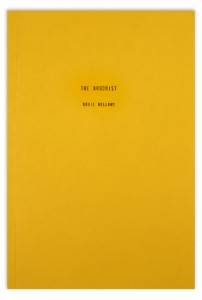I read the buddhist in one big thirsty gulp, lying on my bunk in the hostel during the hottest part of the day. I was avoiding talking to people – to the surfer from Alabama, to the irritating Russians. When I finished, it was just after 4 PM and the surfers were readying themselves for the next high tide. “That’s so gay,” the one from Alabama said, I’m not sure about what. The tide, maybe.
Strangers! So promising in the abstract, so disappointing in reality. Earlier, trying to be the kind of person who makes pleasant conversation in hostels, I had asked the surfer from Alabama – Jeremy – about sharks. Had he ever had to punch one in the nose? Any dramatic shark scars? “Don’t bother them and they won’t bother you,” he said blandly. Everyone at the hostel, Jeremy included, was healthy and brown and had gorgeously muscled arms. Except me. But I still had the ability to find them boring. “Where I’m from, though, it’s mostly bull sharks,” he said, trying a little harder. “And you don’t want to mess with them. They have the most testosterone of any animal.” “Wow,” I said, performing an impressed version of myself. Or was I actually impressed? I can appreciate, after all, the sweet absurdity of dubious facts.
Bellamy remembers, or maybe misremembers, Lacan saying that all relationships are about finding the right distance. In the surfer hostel, with my broken glasses held together with masking tape, with the Russians inanely repeating their favorite South Park dialogue, I clung to the buddhist as if it were a piece of wacky California driftwood keeping me afloat amid the gay high tides of Panama. I got too close. I held its hand. We overextended metaphors together. I can’t tell you how much I needed exactly that, exactly then. A book like a long obsessive smart conversation with a friend who makes mistakes, who remembers (or misremembers) Lacan, who’s always sending you pictures of crones.
But there’s a danger to the kind of brief, one-sided intimacy you can get from good art.
Bellamy discusses at length a video by Kathe Izzo, “the Love Artist,” in which Izzo capers around outside, the camera focused tightly on her face, “her gaze continuously locked on the lens/viewer/lover, registering desperation and excitement.” It’s a performance of true love, and Bellamy finds it both totally convincing and completely unnerving: “To be exposed to ‘true love,’ and then to have it end in a few minutes, can’t help but bring up a profound sense of loss.”
What Bellamy’s offering to the reader is a different but related mix of real and artificial closeness, thanks to the buddhist’s beginnings as a blog. There’s an assumed mutual frame of reference, a backdrop of friends and experimental poets and Taoist internal organ masseuses. Reading it, you get the cozy feeling of going to a dinner party in a strange city and finding that you genuinely get along with all your friends’ friends’ friends. Of course, I wasn’t at a dinner party; I was on a hard little dorm bed, with my laptop scorching my thighs (and not in the fun sexy way that Bellamy talks about). My friends were in Baltimore. The surfers were outside, washing sand off their feet and saying surfer-y things to girls in board shorts and bikini tops. I felt like I had misplaced myself in the universe. I should go drink a beer with them, I thought. I should go ask for some more shark facts. It would be nice to be nice to them. I reminded myself: Small feelings aren’t helped by staying inside hot rooms.
Sometimes I think I travel to rid myself of these small feelings. A month earlier, my plane ride to Panama had been full of a type of people I don’t see very often: fat men with tucked-in shirts, people who seemed to sincerely hope for a Gingrich presidency. “He gave em hell in the debate, didn’t he?” my seatmate said fondly to my other seatmate. Scrunched against the window, I toggled between feeling lonely and spiteful until the turbulence got serious. Then I was just scared. I must’ve looked bad, because the man in the middle seat, the Gingrich fan, started making small talk to distract me. Which was better, in my opinion, RiteAid or Walgreens? He had a spray of broken blood vessels across his nose and referred to his girlfriend as the little lady. He preferred RiteAid. We discussed candy. Despite (or because of?) my plummeting stomach, I felt a blossom of fellow-feeling. We were both humans thrumming along at 20,000 feet. What did politics really matter, in the face of our common animal vulnerabilities?
That’s putting it in California terms, maybe, which Bellamy can do with the best of them. But for all its openness, the buddhist is not all-accepting. It’s a tribal book, and it speaks to a particular tribe that’s bone-deep with its feminism and its radical politics; membership is extended to the kind of reader who’s automatically suspicious of the pleasures promised by a hotel room to yourself, or a Jonathan Franzen novel, or a heterosexual marriage.
But tribalism is tricky. Membership implies potential for violent exclusions, for turf that needs defending. Usually I prefer the warm, soupy feeling of generalized connection with the universe that comes after airplane turbulence or a hard yoga class, when I’m too frightened or exhausted to sort the world into My Team/Your Team. It’s an easier sentiment to own up to, maybe because it can look from the outside like obedience to that old feminine injunction to BE NICE.
One thing Bellamy is good at, though — and she’s good at a lot of different things – is to insist that it’s important to be difficult sometimes: “An in-your-face owning of one’s vulnerability and fucked-upness to the point of embarrassing and offending tight-asses is a powerful feminist strategy.” Adhering instead to that other injunction (BE YOURSELF) has an inevitable cost – it makes other people uncomfortable. And Bellamy grants her readers permission to do exactly that.
Which is not to say that I embarrassed or offended any surfers. Instead, I ignored them and walked down to the ocean. In Central America, you can be in Eastern Standard Time while sticking your toes in the Pacific, which still felt like a magic trick to me. The waves had died down and the surfers were up at the bar – the tide was, I figured, maximally gay – and so I had the beach to myself. I was wearing my clothes, no bathing suit, but had a sudden desire to get very wet. As I waded up to my knees and then deeper, I thought about my friends, and my friends’ friends, and California. Our tribe and its excellent books and haircuts and dinner parties and crone vision. I wondered what the opposite of a bull shark was. I wanted to be it.



